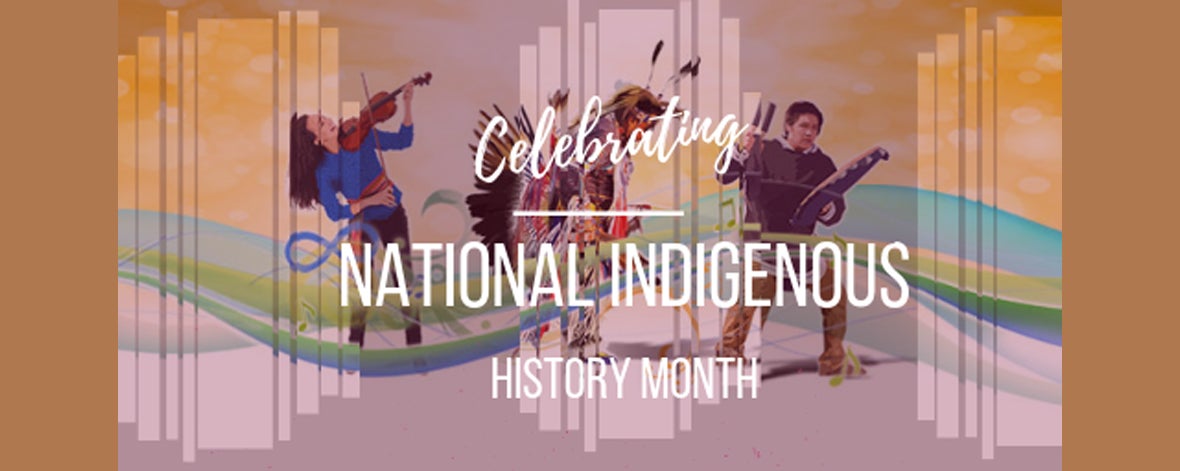National Indigenous History Month
What is National Indigenous Month?
In June, Canadians celebrate National Indigenous History Month to honour the history, heritage and diversity of Indigenous peoples in Canada. It is also an opportunity to recognize the strength of present-day Indigenous communities.
National Indigenous History Month is a time for learning about, appreciating and acknowledging the contributions First Nations, Inuit and Métis people have made in shaping Canada.
The history of First Nations, Inuit and Métis is essentially the very history of our country as they are the first peoples of Canada and continue to play important roles in its development and its future. Learn about the history of Indigenous peoples in Canada, their contributions to the War of 1812, Reconciliation and more.
Understand the significant developments affecting First Nations communities from the pre-Contact era (before the arrival of Europeans) up to the present day.
Find out about some of the ways the Government of Canada and Indigenous organizations, individuals and communities are working together to advance a nation-to-nation relationship.
First Peoples of Canada virtual exhibition
Experience this virtual exhibition that looks at facets of the history of Canada’s Indigenous peoples, based largely on information and artifacts presented in the First Peoples Hall of the Canadian Museum of History.
Learn the importance of the Royal Proclamation of 1763 in laying the foundation for First Nation rights, the treaty-making process and the relationship between First Nations and the Crown.
Explore how the treaties the Crown has signed with Indigenous peoples since the 18th century have contributed to the evolution of Canada as we know it.
Indigenous contributions to the War of 1812
Discover how First Nations warriors and Métis fighters played important roles defending British territories in the War of 1812 against invading American forces.
Learn about the inter-generational damage caused by Indian Residential Schools and the efforts being made to bring a fair and lasting resolution to this chapter in Canadian history.
Indigenous contributions during the First World War
Find out about the thousands of Indigenous peoples who voluntarily enlisted in the Canadian military during the First World War.
Indigenous contributions in the Second World War
Learn about the experiences of Indigenous men and women before, during and after the Second World War.
Kids' Stop
Find activities, games and stories for youth and educators about Indigenous peoples' culture, history and languages.
Play fun games and activities that will teach you more about Indigenous peoples.
Learn more about Indigenous peoples, history and culture through stories and activities.
Find exercises, projects and activities for students.
Find fact sheets and activities about Indigenous peoples, culture and history.
Indigenous Reads
#IndigenousReads encourages reconciliation between Indigenous and non-Indigenous peoples by sharing Indigenous literature.
Tips on starting a book club
Reading is knowledge. Want to talk about what you just read? Why not start a book club? It's a great way to share experiences and explore themes discussed in the book. It can also be a great reason to get together with family and friends.
Don't forget to include an Indigenous author in your suggested readings.
Here are some basic steps to start up your own book club:
- Ask friends, family, classmates or co-workers to participate in your book club.
- Find a location to have your initial meeting, for example at home, the lunch room, classroom, community center or online.
- Before starting your book club get together either online or in person to make decisions on:
- date and time for your first club meeting (at each meeting you can set a date for the next one)
- location for your meetings (at each meeting you can change your location for the next meeting, if needed)
- how often do you want to meet (meeting monthly is popular)
- theme or genre
- decide on your first book
- Make sure everyone is starting to read the selected book 2-3 weeks before club meeting.
- Ask members to bring at least one question, comment or passage from or about the book.
- Visit the author's web pages for online resources and discussion ideas.
- Gather and discuss what you have learned.
- Decide on when you will choose the next books.
If you have chosen a book with by an Indigenous author, take a picture of your meeting and share it on social media by using #IndigenousReads.
Have fun!
